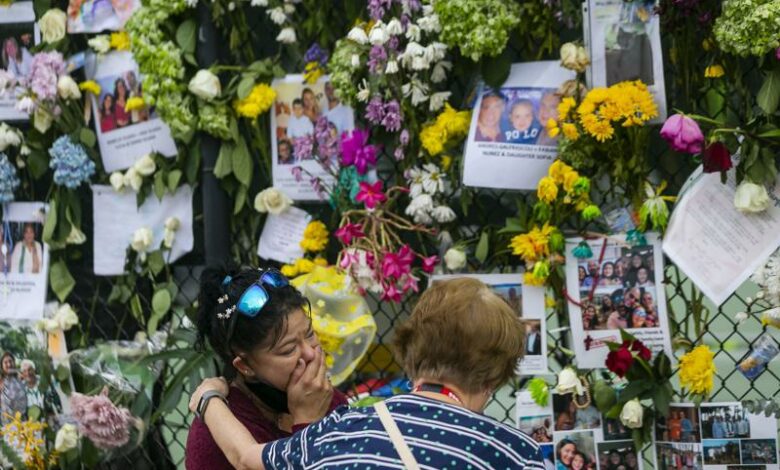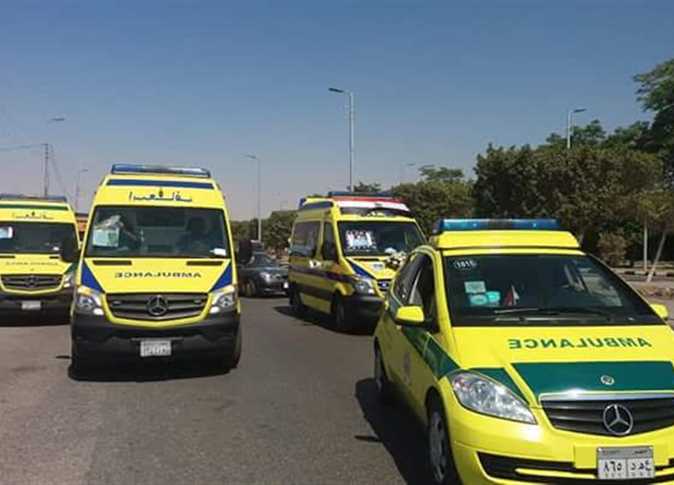
After Lauren Miller lost her father in January to COVID-19, her longtime friend Jay Kleiman advised her not to wallow in grief and to seek counseling to ease her pain.
Now she finds herself grieving again — only this time for Kleiman, one of scores of people believed to be underneath the rubble of a 12-story condominium tower in Florida that collapsed over a week ago, killing at least 24.
“I’m sure he’d tell me: ‘It’s OK to be sad — this is very, very sad — but you have to move forward, and you have to be strong,’” Miller said, her voice cracking.
While hundreds of rescuers continue their desperate search for survivors within the remains of the Champlain Towers South in Surfside, a smaller cadre of mental health counselors have also been deployed to help families and other loved ones confront overwhelming feelings of grief, fear and anger.
For every person still unaccounted for — 121 as of Saturday — many more lives have been turned upside down as people await word on loved ones or answers that will explain what brought about the calamity. It has been a week since any survivors have been pulled out, and the emotional and psychological fatigue are taking their toll.
More than two dozen grief counselors are on duty at the family assistance center in a hotel ballroom where daily briefings are held. When relatives arrive, a so-called navigator helps assess their immediate needs and decides if a mental health specialist should be called in.
“Sometimes you’re just putting a hand on a shoulder and don’t say a word,” said Miami-Dade Police Capt. Rita Rodriguez, a crisis intervention officer who is consoling the families. “Because a lot of them just want to tell you about their family member and they want to tell you about how they feel.”
Mindful of the fact that little things have the power to touch off intense sorrow, officials have been removing potentially triggering details — a poorly chosen black sheet draped in a hallway, floral bouquets that arrived with the best of intentions but lent a funereal ambience to the scene.
During the briefings, the counselors scan the room for signs of distress. Handlers lead comfort dogs around the space to be petted, and sometimes to sit for a spell on people’s laps. Rooms are available for anyone who needs counseling in private.
“When we see that there’s a person crying, whatever it is, we will have the psychotrauma therapists walk over. They start by offering a box of tissue. And if they want us to sit, we sit; if not, we just stand there and ask if they want to talk,” said Annika Holder, Miami-Dade County’s incident commander at the center.
Alfredo Lopez, who narrowly escaped his home of 24 years along with his wife and 24-year-old son, rattled off the names of missing friends — too many to keep count. The survivor’s guilt was so overwhelming in the first few days after the collapse that he sought help from the counselors.
“They spoke in a very soothing, very loving, motherly way,” said Lopez, 61. “It meant a lot to me.”
A website, surfsidestrength.com, has been set up as a portal for accessing help later or for those who are grieving from afar — like Miller, who is in New York.
Florida bills itself as the first state in the nation to establish a “disaster recovery mental health coordinator” position whose sole focus is to marshal critical mental health services following a disaster.
That official, Darcy Abbott, acknowledged that the long wait has caused tremendous stress for relatives of the missing.
“This is very tough, because it was unexpected and it was extremely tragic,” Abbott said.
Florida first lady Casey DeSantis, who has made mental health a key initiative, and Gov. Ron DeSantis have also met with the families.
“We have witnessed firsthand the profound emotional toll this disaster has taken on the lives of so many,” she said, describing their stories as “heart-wrenching but also inspiring.”
Florida has had its share of traumatic events, from the mass shootings at Marjory Stoneman Douglas High School in 2018 and the Pulse nightclub two years earlier to the periodic hurricanes that level entire communities.
While different, the horror of the building collapse can have similar psychological fallout, said Dr. Katherine Shear, director of Columbia University’s Center for Prolonged Grief. The danger, she said, is when people find their lives grinding to a standstill and can no longer function in a meaningful way.
“Over time most people will come to terms with it,” Shear said, “but some people just can’t.”
Emergency responders are at risk for mental trauma, too, as they labor around the clock and encounter heartbreaking scenes. On Friday they pulled from the rubble the body of a 7-year-old girl, the daughter of a Miami firefighter who was part of the search effort. So counselors are embedded with the crews to offer support.
“Obviously, the firefighters are emotional,” Miami-Dade County Fire Chief Alan Cominsky said. “You know it takes a toll.”
Rescuers have not found anyone alive since the first hours after the Champlain Towers South collapsed in the early hours of June 24.
Among those confirmed to have died are family members of Kleiman, who was in town from Puerto Rico to attend a funeral.
When Miller last spoke to him, they talked about her son’s recent prom and the pride Kleiman felt after his daughter landed an internship.
Miller is leaning on friends for comfort and may soon return to her grief counselor. Against long odds, she clings to hope he will somehow turn up alive and imagines him trapped with others in a pocket of space inside the wreckage.
“And he is telling them not to give up,” Miller said, “as they wonder how many more days before they are found.”
___
AP writer Kelli Kennedy in Fort Lauderdale, Florida, contributed to this story.




